All They Want for Christmas Is a Biogas Generator
Franklin, Vermont farmers Denna and Mike Benjamin were heading into the holidays with a big wish: natural gas to start their anaerobic digester to convert the methane fro their cows’ manure to electricity. The project was partially funded by a federal grant, and if the digester was not operating by year’s end they would lose a major portion of the money.
The challenge they were facing was not living near a natural gas pipleline and a “shot of pure gas” was needed to get the biogas generator going. So the Benjamins called NG Advantage, a company that trucks compressed natural gas (CNG) to very large industrial 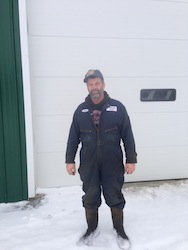 customers not located on gas pipelines. The company brings several tractor-trailer loads of gas each day to their large customers, whose factories run their boilers 24/7. These isolated facilities save an estimated 20-40 percent on their fuel bills and emit 26 percent less CO2. The Benjamins hoped that NG Advantage could bring them the much-needed natural gas to get their digester operating.
customers not located on gas pipelines. The company brings several tractor-trailer loads of gas each day to their large customers, whose factories run their boilers 24/7. These isolated facilities save an estimated 20-40 percent on their fuel bills and emit 26 percent less CO2. The Benjamins hoped that NG Advantage could bring them the much-needed natural gas to get their digester operating.
Even though the Benjamins did not need a trailer full of gas, NG Advantage worked with the Benjamins’ engineer, John Forcier of Forcier Consulting Engineers PC, Christopher Herrick, the Chief of the Vermont HAZMAT Response Team, Mike Raker of the Green Mountain Power Renewable Development Fund, Robert Achilles of the Vermont State Agency of Agriculture, and a Canadian company Bio-Methatech, to make a small delivery of gas available to the Benjamins within two days of the phone call. General Transportation of Bridge Water, MA (NG Advantage’s hauler) provide the use of their tractor at no charge to help reduce the cost.
NG Advantage’s VP of Operations and Safety, Gerry Myers, organized the holiday rescue team. He explained why the company went out of its way to help the Benjamins, “Environmental stewardship and embracing the needs of our community at large are embedded in our company’s daily operations. Helping the Benjamin family and Riverview Farm achieve success with their digester project was the right thing to do.”
Denna Benjamin described why it is important for them to build a digester at the Riverview Farm by saying, “We, as other farmers, are looking for ways to diversify our income steam so that we can keep farming. This project seemed like a way to do that and to improve the environment at the same time.”
The Benjamins built the anaerobic digester to use the manure from their cows to create electricity that they can sell back to the grid, to generate heat their farm, and to create a byproduct that provides dry bedding for the cows. By using the methane from the manure to generate electricity, they also eliminate the substantial release of greenhouse gas that would have otherwise naturally occurred.Read More
Seasons Greetings From Greenbelt Resources
Twas the night before startup, and all through the plant
Not a creature was stirring, not even an ant.
The wiring was hung by the electrician with care,
With hopes that good lining would keep them from wear.
The cooker tank was nestled on a slant on its beam,
While starchy feedstock inside it mixed with enzymes and steam.
The fermenters sat empty from bottom to hatch;
The system on idle before its long process batch.
 When out in the parking lot arose an engine’s roar,
When out in the parking lot arose an engine’s roar,
I sprang down from the catwalk and headed for the door.
Past the boiler I flew with wind at my back,
I grabbed the door handle and open’d just a crack.
With the sun just setting down past the airport,
The shadows grew longer making sight tough to sort.
When who in the lot to mine eyes should appear,
But a tanker truck, full of what looked to be beer.
Despite a sharp reflection off the trucks’ front windshield,
I knew in a moment it must be Butterfield.
Then quickly behind, other feedstock trucks came,
And he pointed, and shouted, and directed by name!
“Here beer waste, here crop wastes, here waste wines and waste booze,
There soda, there sports drinks, there juice and waste foods!
To the back of the lot! To the back of that wall!
Pull in quickly big rigs, pull in quickly you all!”
As professional drivers on a closed course do drive,
when instructions were finished, their gears came alive.
So into the lot the tankers they flew,
With an assortment of feedstocks, and Butterfield too.
And then, with a swoosh, I heard in the pipes
The flowing of liquids of various types.
As I drew in my head, and was turning around
Through the bay door Butterfield came with a bound.
He was dressed like a local, from his cap to his boot,
In a button-down and jeans, the local version of a suit.
He looked at the tanks all filling, wide-eyed.
You could see by his stance he was brimming with pride.
His eyes…how they sparkled! His smile, quite friendly!
He walked straight to the control screen and touched it ever so gently.
All around us the tanks were now full to their brims.
I wondered if we’d all might soon have to swim.
Just as fast as it started, the filling stopped with a squirt.
And then I wondered how such varied feedstocks would convert.
A wink of his eye and a twist of his head,
Soon gave me to know I had nothing to dread.
He spoke not a word, but went straight to his work,
And activated preset system programs; then turned with a jerk.
And lifting his cap by its hard edged visor,
He nodded toward the screen, leaving us all a bit wiser.
He hopped in his rig, to the others gave a whistle,
And away they all drove as fast as a missile.
But I heard him exclaim, like a Saint to his disciple,
“Make Fuel, Fertilizer and Filtered Water from your food wastes; Happy Holidays to all, but please remember to Recycle!”
BioEnergy Bytes
 According to POET-DSM Advanced Biofuel, their first commercial cellulosic bio-ethanol plant remains on schedule for startup in the first part of 2014 as workers continue equipment installation and other activity through the winter. “Project LIBERTY” will produce 20 million gallons of cellulosic biofuel per year – later ramping up to 25 million gallons – from corn cobs, leaves, husk and some stalk. Commissioning for select parts of the process is scheduled to begin in January.
According to POET-DSM Advanced Biofuel, their first commercial cellulosic bio-ethanol plant remains on schedule for startup in the first part of 2014 as workers continue equipment installation and other activity through the winter. “Project LIBERTY” will produce 20 million gallons of cellulosic biofuel per year – later ramping up to 25 million gallons – from corn cobs, leaves, husk and some stalk. Commissioning for select parts of the process is scheduled to begin in January.- Amyris, Inc. has announced an agreement to sell senior convertible promissory notes in a private placement for $28 million in cash proceeds. Under the terms of the agreement, one of Amyris’s largest stockholders, Temasek, in conjunction with new investors affiliated with Wolverine Asset Management, agreed to purchase an aggregate $28 million of the notes. Temasek’s participation will complete its commitment to purchase notes under the Company’s previously announced two-stage convertible note placement. Amyris expects the closing of this placement to occur on or about January 15, 2014.
- Vestas has received a 117 MW order for the first utility-scale wind power plant to be built in Jordan. The project consists of 38 V112-3.0 MW turbines which will be installed about 180 km south of Amman, in the Tafila region, Jordan. Delivery of the turbines will start in the second quarter of 2014, and the wind power plant is expected to be commissioned in the second quarter of 2015. The contract for the Al Tafila wind power plant includes supply, installation and commissioning of the wind turbines, civil and electrical works, a VestasOnline Business SCADA solution as well as a 10-year custom-designed energy based service agreement for the entire wind power plant. The order has been placed by Jordan Wind Project Company (JWPC), a company set up by InfraMed Infrastructure, Masdar and EP Global Energy (EPGE).
- BBI International has announced the agenda for the technical sessions of the 7th annual International Biomass Conference & Expo, taking place March 24-26 in Orlando, FL. The 2014 main program will include 30-plus panels and more than 100 speakers, including 90 technical presentations, all within the structured framework of four informative tracks: Track 1: Pellets & Densified Biomass; Track 2: Biomass Power & Thermal; Track 3: Biogas & Landfill Gas; and Track 4: Advanced Biofuels & Biobased Chemicals.
Community Fuels Gets $4.9 Mil to Expand Biodiesel
 A California biodiesel refinery has received a $4.9 million state grant to expand its biodiesel operation. Biodiesel Magazine reports Community Fuels picked up the California Energy Commission grant for its Port of Stockton biorefinery.
A California biodiesel refinery has received a $4.9 million state grant to expand its biodiesel operation. Biodiesel Magazine reports Community Fuels picked up the California Energy Commission grant for its Port of Stockton biorefinery.
“Community Fuels’ biorefinery was specifically designed to allow for multiple phases of expansion,” said Lisa Mortenson, co-founder and CEO of Community Fuels. “This important grant will enable our team to expand our production capabilities to meet the anticipated demand for low carbon fuels expected as a result of the California low carbon fuel standard (LCFS).”
Chris Young, director of operations for Community Fuels, said, “Through years of dedicated effort we successfully commissioned and optimized our biorefinery which has a reputation for producing one of the highest quality biomass-based diesel fuels in the nation. That work will contribute greatly to our ability to install and commission this next phase of expansion. With this new project, we will maintain our focus on quality and compliance.”
“In the initial phase of construction, Community Fuels invested heavily to have a robust, onsite laboratory,” said Steven Sabillon, laboratory manager. “We are the first in the nation to secure both BQ-9000 laboratory and producer certifications. These existing analytical capabilities will be relied upon during the installation and commissioning efforts associated with the expansion.”
The grant was funded through California’s Alternative and Renewable Fuel Vehicle Technology Program.
IL State Rep Moffit: Ethanol is Still Exciting
Illinois State Representative Donald Moffitt knows agriculture. He grew up on a family farm, on which his son still farms (and Don occasionally helps). This has been a huge asset for him in his role because agriculture is the number one industry in both the 74th District as well as the state of Illinois.
Rep Moffitt was serving in this role seven years ago when Patriot Renewable Fuels broke ground on their ethanol plant (and in November they broke ground on a biodiesel plant) and I asked him what 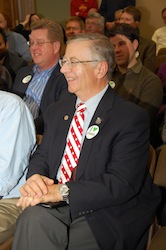 the feelings were like about ethanol during that time. He said there was a lot of excitement and there still is a lot of excitement.
the feelings were like about ethanol during that time. He said there was a lot of excitement and there still is a lot of excitement.
“But finally, we’d been hearing about ethanol. We knew as farmers and producers we wanted to encourage the use of ethanol,” said Rep. Moffitt. “We were trying to get acceptance of ethanol years ago and finally one comes to our area with the construction of Patriot Renewable Fuels. So it was genuine excitement.”
The excitement went way beyond agriculture, explained Moffitt. First there were the construction jobs to build the plant and that brought a lot of jobs and economic activity to the area. Once the plant was running, there are the permanent jobs and then he noted there is the benefit to the community such as value added benefits to corn, for example. Producers are now able to get a higher price for their corn. The economic activity of Patriot brings more people to the restaurants, to the gas stations and other local businesses.
“So it’s a win-win for our state, for our community, for agriculture and we need to have this type of diversity,” said Rep. Moffitt.
He noted that biofuels help our entire nation by creating a more diversified fuel supply, and they reduce our dependence on foreign oil. “And I’m old enough to remember oil embargoes that occurred in the past, and long lines at gas stations when OPEC embargoed shipments to the U.S.,” said Rep. Moffitt. “It put us in a real bind. With a domestic supply that is also a renewable supply it helps relieve that problem; it helps prevent it from happening. We’d be better off, safer as a nation, if our fuel was all domestic 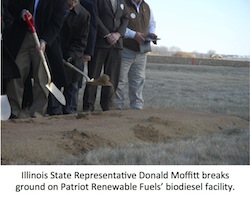 and renewable. So ethanol and biodiesel help make that happen. It’s a trend in the right direction.”
and renewable. So ethanol and biodiesel help make that happen. It’s a trend in the right direction.”
Moffitt continued, “The production of biofuels is actually a national security issue. Because we don’t want to be dependent on foreign countries for our energy supply. Not all of them are friendly to the United States. But the American farmer is always going to be our friend.”
“For the distractors from biofuels, if they want to depend on foreign oil for energy supplies they can do that,” said Rep. Moffitt. “They’re wrong and its not a safe concept to have. We must have as much of our energy, and I hope all of our energy eventually, produced right here.”
Listen to my interview with IL State Rep Donald Moffitt here: IL State Rep Moffitt: Ethanol is Still Exciting
Check out the Patriot Renewable Fuels photo album.
BioEnergy Bytes
 Broadwind Energy, Inc. has announced new tower orders from Siemens. Broadwind will produce these towers in its Manitowoc, Wisc. and Abilene, Tex. facilities. Since the start of 2013, Broadwind has recorded $389 million in new tower orders.
Broadwind Energy, Inc. has announced new tower orders from Siemens. Broadwind will produce these towers in its Manitowoc, Wisc. and Abilene, Tex. facilities. Since the start of 2013, Broadwind has recorded $389 million in new tower orders.- POET has reached its first milestone under the company-wide “Ingreenuity” sustainability program. Since 2009, POET biorefineries have produced more than 700 million pounds of bio-based products, surpassing the target set in 2010. POET’s increase in production of bio-based products has been led by Voilá™ Corn Oil, which is now installed in all of POET’s 27 plants and is responsible for over 700 million pounds of product since 2009. In addition to POET’s Ingreenuity goals, POET produces approximately 9 billion pounds of high-protein animal feed annually and has sold more than 1.2 million tons of liquefied CO2 into U.S. markets since 2009.
- Natural Power has been appointed by Vattenfall as Ecological Clerk of Works at Clashindarroch Wind Farm in Aberdeenshire, Scotland. The 18-turbine development will have an installed capacity of 36.9 MW, generating enough electricity to power over 20,000 homes.
- Admirals Bank, a provider of residential renewable energy financing, will participate in an effort alongside EmPower Solar to offer Breezy Point, New York residents financing options to purchase solar systems for their homes. The Breezy Point Green Committee developed this initiative to foster the sustainable rebuilding of homes and community buildings affected by Hurricane Sandy.
ACCIONA Turbines Selected for Wind Farm
ACCIONA has signed a contract to supply 34 turbines for a 102 MW wind farm in the Canadian province of Nova Scotia. The company will carry out the construction, internal electrical infrastructures and assembly, and will also undertake the operation and maintenance of the facility.
The South Canoe wind farm, which will be the largest in Nova Scotia, has been developed by three local companies: Oxford Frozen Foods, Minas Basin Pulp and Power and the utility company Nova Scotia Power, to which the power generated will be sold. It will use ACCIONA Windpower AW3000/116 wind turbines, each with a capacity of 3 MW, hub height of 92m, and a rotor diameter of 116 metres.
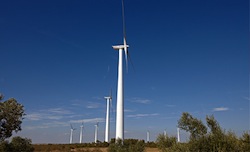 The facility will supply electricity equivalent to the consumption of 32,000 homes and will help the province of Nova Scotia reach its renewable energy targets.
The facility will supply electricity equivalent to the consumption of 32,000 homes and will help the province of Nova Scotia reach its renewable energy targets.
“ACCIONA was able to deliver what the South Canoe Project team asked for: a complete solution including highly-reliable and high-capacity turbines, construction services and operations and maintenance,” said Ilya Hartmann, CEO of ACCIONA Energy North America. “We’re pleased to apply our full range of wind energy services to provide the best value for this project.”
ACCIONA Windpower North America CEO Enrique Teruel says the company “is proud to be part of the South Canoe Wind Project and to continue expanding the track record of our AW3000 turbine in North America.”
To date, orders for the AW3000 turbines amount to 1,491 MW and the wind turbines are destined for wind farms in nine different countries. Nearly half this figure corresponds to wind farms in North America, and 78 percent of the total capacity will be supplied to customers outside the ACCIONA Group.
UL Approves Biobutanol Use for Storage & Dispensing
Butamax Advanced Biofuels, LLC, has announced that a joint research program with UL (Underwriters Laboratories) has determined that gasoline fuel storage and dispensing equipment meeting latest UL standards can safely and successfully use blends of up to 16 percent biobuta nol. This is the first time that UL has made such a determination.
nol. This is the first time that UL has made such a determination.
Butamax’s Fuel Product Manager, James Baustian, said, “UL represents the gold standard for product safety, testing, and certification. This guidance clears the way for State Agencies to consider and approve dispensing of isobutanol gasoline fuel blends. This is a major milestone for the commercial distribution of biobutanol. Butamax will immediately begin to work with State and Federal authorities to complete final approvals for dispensing of gasoline containing isobutanol.”
State regulations require fuel dispensing equipment to be listed by independent product safety testing laboratories such as UL. Butamax says at the time current UL dispensing equipment test standards were finalized, biobutanol was not commercially available and was not tested. This announcement by UL means that if butanol had been available as a fuel, says Butamax, it would have been included for service use in equipment meeting latest UL standards.
Butamax CEO Paul Beckwith added, “UL has conducted a comprehensive assessment of isobutanol compatibility jointly with Butamax and we have found them to be an excellent technology partner. This milestone is a reflection of UL’s commitment to promotion of new product safety, together with Butamax’s fuel market expertise.”
OriginOil Launches Aquaculture Showcase
OriginOil has launched its Permanent Technology Showcase with a demonstration of its EWS Aqua Q60 and EWS Algae A60 models at Aqua Farming Tech, a sustainable fish farm in Thermal, California, located in the Coachella Valley.
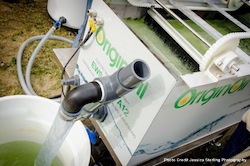 “Worldwide, more fish is now being farmed than beef,” said Riggs Eckelberry, president and CEO of OriginOil. “While this is good news, the aquaculture industry will have to address the environmental and operational problems it faces if it is to continue to grow, including the fact that fish is often farmed under toxic conditions. Our Coachella Valley showcase is intended to serve as a living demonstration of the feasibility of clean, sustainable aquaculture.”
“Worldwide, more fish is now being farmed than beef,” said Riggs Eckelberry, president and CEO of OriginOil. “While this is good news, the aquaculture industry will have to address the environmental and operational problems it faces if it is to continue to grow, including the fact that fish is often farmed under toxic conditions. Our Coachella Valley showcase is intended to serve as a living demonstration of the feasibility of clean, sustainable aquaculture.”
OriginOil’s commercial fish farming pond water treatment system can rapidly remove ammonia, bacteria and other aquatic invaders from pond water. And farmers who want a healthier and less-expensive alternative to fish meal can use OriginOil’s algae harvesting system to produce nutritious fish feed. Together, the OriginOil Aquaculture System can help spur the growth of sustainable fish farming on a global scale by reducing costs, eliminating the need for chemical treatment and improving the quality of the product.
Aquaculture is a fast-growing industry. The $100 billion industry is expected to increase by 33 percent between 2012 and 2022, compared to an increase of only 3 percent in capture fisheries, according to the United Nations (The State of World Fisheries, P. 206). But the growth is leading to operational and environmental problems, including the high costs of energy and fish feed, which have forced many fish farms in the Coachella Valley to close.
According to OriginOil, EWS works by recirculating water through a low-voltage electrical pulsing system that causes contaminants or algae to coagulate, or clump together. The clumped-up material then enters a second stage in which low-power electrical pulses generate a cloud of micro-bubbles that gently lift the concentrate to the surface for harvesting.
The EWS Aqua Q60 commercial fish farming pond water treatment system can service 50,000 liters daily, says OriginOil, while consuming less than 20 kilowatt-hours of electricity per day (about $2.40 worth). The system is designed to reduce fish stress and improve yields, while sharply reducing or eliminating the need for chemicals and antibiotics.
The EWS Algae A60 is a mid-scale harvester that can process up to 60 liters (16 gallons) per minute of algae water. Individual EWS Algae A60 units can be assigned to manage a pond or bioreactor assembly of up to 500,000 liters. Units can be combined to achieve massive parallel processing capability. The unit removes 99 percent of the water to produce an algae concentrate. Algae-based fish feed costs up to 60 to 70 percent less than traditional fish feed.


